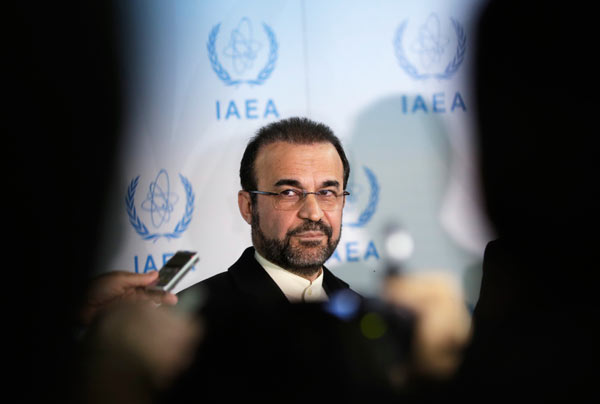Iran says nuclear deal to be implemented in late Jan
Updated: 2014-01-01 01:08
(Agencies)
|
|||||||||||
 |
|
Iran's ambassador to the International Atomic Energy Agency (IAEA) Reza Najafi attends a news conference at the headquarters of the IAEA in Vienna December 11, 2013. [Photo/Agencies] |
DUBAI - World powers and Iran have agreed to start implementing in late January an agreement obliging Tehran to suspend its most sensitive nuclear work, an Iranian official was quoted as saying on Tuesday.
There was no immediate confirmation of the agreement from the six powers - the United States, Russia, China, France, Britain and Germany - or the European Union, which oversees contacts with Iran on behalf of the six.
The reported agreement follows nearly 23 hours of talks between nuclear experts from Iran and the six powers held in Geneva on Monday and Tuesday.
The seven countries have met several times since striking the breakthrough accord on November 24 to iron out practical details and decide when the deal would be implemented.
An Iranian nuclear negotiator, Hamid Baeidinejad, said a date was agreed on Tuesday.
"Based on the conclusions [reached in] the talks held with ...expert delegations, the implementation of the Geneva accord will start in the third ten-day of January," Baeidinejad was quoted as saying by Iranian Press TV.
"The two sides managed to reach an understanding on the implementation of the agreement and now, their views and interpretations are the same," he said.
A spokesman for EU foreign policy chief Catherine Ashton had no immediate comment.
Western diplomats have said in the past that January 20 was a possible implementation date, because that is when EU foreign ministers next meet in Brussels and could agree on the lifting of EU sanctions.
Western countries led by the United States fear that Iran's nuclear work has military goals and have imposed years of sanctions on Iran in an effort to force Tehran to curb its nuclear programme.
Iran denies seeking to build an atomic bomb and says its nuclear work is aimed at power generation and medical research.
Under the November 24 agreement, Iran will suspend its most sensitive uranium enrichment efforts and, in return, Western governments will ease some economic sanctions.
The sequence of these moves appeared to be a sticking point in the expert talks, with divisions focusing on how much prior notice Iran will give Western governments that it is meeting its end of the deal before they lift the agreed sanctions.
Iran's deputy foreign minister, Abbas Araqchi, was quoted saying earlier that he was likely to meet Helga Schmid, Ashton's deputy, to further discuss some issues next week.
The technical talks started on December 9 but Iran broke them off briefly after the United States blacklisted an additional 19 Iranian companies and individuals under its existing sanctions.
Iranian officials said the move violated the spirit of the deal but U.S. officials said it did not breach the agreement.
Related Stories
South China nuclear plant starts operation 2013-12-31 21:14
China-Pakistan nuclear co-op 'peaceful' 2013-12-23 22:05
Russia launches 2nd Borei-class nuclear submarine 2013-12-23 21:27
Iran, world powers to continue nuclear talks 2013-12-23 16:59
Iran, six powers to resume talks after snag 2013-12-19 17:18
Treasure the progress so far 2013-12-23 07:27
Today's Top News
Iran says nuclear deal to be implemented in late Jan
Putin vows to annihilate "terrorists" after bombings
China to promote cultural soft power
Cities go live with air quality updates
Second kid 'easier said than done'
Russian police detain dozens after bombings
Death toll in Russia's bombings rises to 33
Xi's bun shop visit wows media
Hot Topics
Lunar probe , China growth forecasts, Emission rules get tougher, China seen through 'colored lens', International board,
Editor's Picks

|

|

|

|

|

|





